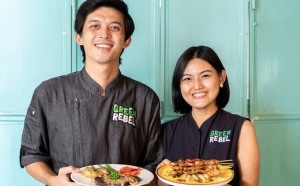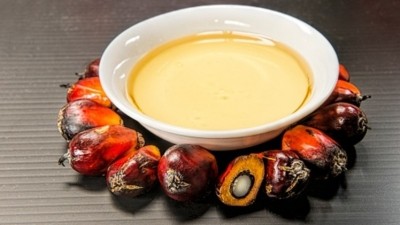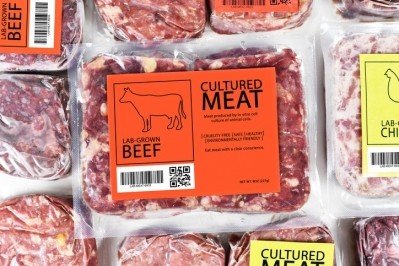Indonesia alternative protein start-up Green Rebel targets Singapore retail shelves in Q3 2022
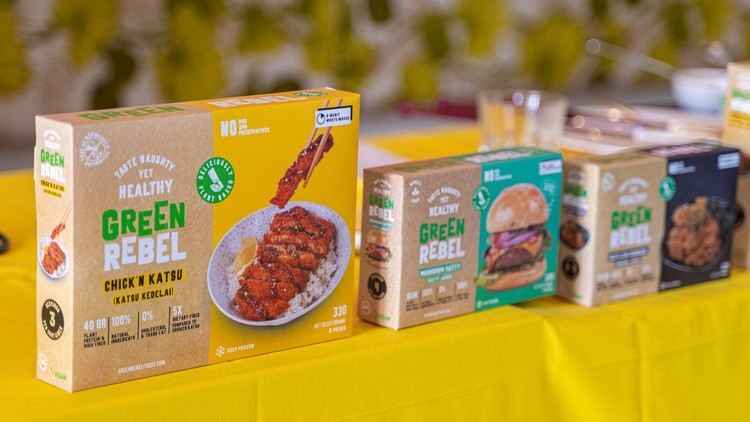
It is also developing a B2C e-commerce platform and plans to enter existing popular e-commerce sites to boost retail sales as part of its expansion plans.
However, founder Helga Angelina Tjahjadi declined to reveal the major supermarket chains at this stage.
The launch of the brand in Singapore and its partnerships with local restaurants was announced on 30 March.
Singapore is also the first country Green Rebel is expanding to outside Indonesia. Its partners include modern Chinese restaurant Empress, casual all-day café Privé, Love Handle at Ann Siang, speakeasy eatery Dragon Chamber and modern steamboat restaurant Queen of Wok.
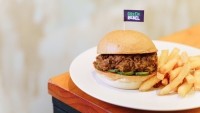
“Singapore is like a gateway to South East Asia, with its melting pot of cultures. It is a great place to test the palate acceptance of our products.
“For our partners, they have even managed to make our proteins part of their bestsellers, such as Love Handle’s ‘rendang burger’ and the Empress’s black pepper ‘beef’.
“The response has been super positive, and our hard work has paid off.
“We definitely want to enter more markets and currently surveying more than 15 countries in APAC, Middle East, Europe and the US. For Q2, we aim to expand to the Philippines and Malaysia, followed by South Korea and Australia in Q4,” said Helga.
She and her chef husband, Max Mandias, established the firm in September 2020 with alternative flavoured proteins signature to Indonesia or Asian-inspired, such as beefless rendang and Chick’n Satay.
In 2013, the vegan duo founded Burgreens, believed to be Indonesia’s largest plant-based restaurant chain. Today, it has 16 outlets in high-traffic locations like the Greater Jakarta area and tourist spots Bandung and Bali.
The APAC expansion plans were made possible through a round of funding worth USD$7m from investors like Unovis (who also backed alternatives Oatly and Beyond Meat), Better Bite Ventures, AgFunder, Teja Ventures, CJ Group and entrepreneur Kane Lim.
‘Meat’ the ‘meat’
According to Helga, what started as a hobby of experimenting with food in 2013 sprung into a restaurant chain. Subsequently, they invested in more research and development (R&D) and coordinated with more than 35 suppliers across Indonesia and overseas firms in Taiwan and China.
Around 2013, they would use ingredients such as mushrooms, cassava and rolled oats to make ‘meat’ patties. Fast-forward to 2018, they started R&D into the mimicry of meat and produced alternatives to beef and chicken using various mushrooms and non-GMO soy. These ingredients were also formulated with spices and herbs like galangal, turmeric and chilli.
These efforts resulted in two in-house technologies – the Green Rebel Texturisation and the Green Rebel Emulsion. The Texturisation claims to be a novel process in formulating shiitake mushrooms and soy to mimic the fibrous textures of beef, whereas the Emulsion fortifies the blend with juiciness and replaces animal fat with coconut oil.
Helga said that Green Rebel’s formulations could withstand strong heat, as in barbecues, and high moisture, like hotpots, usually found in Asian cooking.
Its current plant in south Tangerang, near the capital Jakarta, produces 60 tonnes of product monthly. However, they are testing a commercial factory in the same area, which is expected to be fully operational and can produce an output of 600 tonnes monthly.
Since Green Rebel’s inception in 2020, she said its revenue had increased six-fold, channelled from 800 food outlets in Indonesia and Singapore.
The products and their impact on earth were audited by the higher education and research institute in Jakarta, Institute for Life Sciences in Indonesia (I3L).
New ‘meats’ on the block
The firm will release new ‘meat’ formulations and flavours – Hainanese-style ‘chicken’, ‘siew mai’ and ‘gyoza’ – in Q2 for Indonesia and Q3 in Singapore.
Additionally, it is developing dairy-free mayonnaise and cheese, which is expected to be introduced in Q3.
It will also build more partnerships in Singapore, such as with Tanamera Coffee and Shangri-La Rasa Sentosa.
“Plant-based firms are usually supportive of one another. We are all working towards the same goal. The more players, the better it is because we all want change to the food we consume, such as less meat and dairy. Our peers are other players, not competition. They’re healthy competition. Their success is also our success and success as a whole for the industry,” said Helga.
